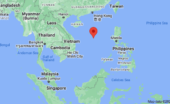Re Ian Bremmer 'Could third-party candidates upend the 2024 US election?' 3 April The current political movement in the USA…
UN ruling on Australia's continental shelf
Written by Diana Thebaud Nicholson // April 22, 2008 // Environment & Energy, Public Policy, United Nations // 1 Comment
How may this affect the positioning of the nations claiming the Arctic? We note that the UN body involved in this decision is not UNCLOS, but the UN Commission on the Limits of the Continental Shelf.
Australia becomes a whole lot bigger after UN ruling
The ruling clarifies the extent of Australia’s control over the part of the continent that is submerged beneath the sea and follows requests by successive governments for clarification. The result could mean a “bonanza” in oil and gas reserves. But while Australia acquires rights on the resources beneath the seabed, it does not gain control over shipping or whaling in the areas.
One scientist suggested that the ruling, by the UN Commission on the Limits of the Continental Shelf, would enable Australia to designate biologically sensitive regions as protected marine areas.
Martin Ferguson, the Federal Resources Minister said the territorial expansion meant “for a resource-rich nation such as Australia, added resource entitlements going to issues of oil and gas. But also, you might say, additional responsibilities in terms of the floor of the seabed … It also raises questions about what potential regimes might be necessary in the future to encourage such exploration.”




One Comment on "UN ruling on Australia's continental shelf"
Good question!!
This has been reported in newspapers around the world, but the actual UN Commission has yet to mention it on its web site.
I would need to have a look at the bases for accepting the claim, but even then I wouldn’t be able to tell you much, because Canada has yet to submit its own claim. It intends to make one but has until 2013 and is currently carrying out studies, in the Arctic but also on the East and West coasts.
Basically, it depends on the formation of the respective continental shelves.
(Preliminary reaction from a professor of Law who specializes in arctic environmental law)